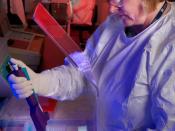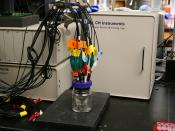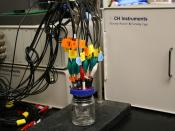Introduction
Biosensors combine the selectivity of biology with the processing power of modern microelectronics and optoelectronics to offer powerful new analytical tools with major applications in medicine, environmental diagnostics and the food and processing industries.
What is a Biosensor? (1)
The term biosensor has been applied to devices either (1) used to monitor living systems, or (2) incorporating biotic elements. The consensus, however, is that the term should be reserved for use in the context of a sensor incorporating a biological element such as an enzyme, antibody, nucleic acid, microorganism or cell. For the purposes of this tutorial, a biosensor will be defined as:
Analytical devices incoporating a biological material or a biomimic (e.g. tissue, microorganisms, organelles, cell receptors, enzymes, antibodies, nucleic acids etc.), intimately associated with or integrated within a physicochemical transducer or transducing microsystem, which may be optical, electrochemical, thermometric, piezoelectric or magnetic.
The usual aim of a biosensor is to produce either discrete or continuous digital electronic
signals which are proportional to a single analyte or a related group of analytes.
Biosensors are analytical devices which use biological interactions
to provide either qualitative or quantitative results.
Where are Biosensors Being Used?
Biosensors are finding use in increasingly broader ranges of application. The following list describes some of the current applications.
Clinical diagnosis and biomedicine
Farm, garden and veterinary analysis
Process control: fermentation control and analysis
Food and drink production and analysis
Microbiology: bacterial and viral analysis
Pharmaceutical and drug analysis
Industrial effluent control
Pollution control and monitoring
Mining, industrial and toxic gases
Military applications
How Can Biosensors Benefit Bioprocesses?
Specificity
Like other bioanalytical methods (such as immunosassays and enzyme assays), biosensors use a biologically derived compound as the sensing element. The advantage of biological sensing elements is their remarkable ability...


